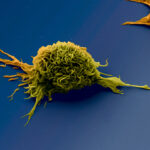Lien vers Pubmed [PMID] – 23685841
Lien DOI – 10.1038/nm.3197
Nat Med 2013 Jun; 19(6): 730-8
Innate sensing mechanisms trigger a variety of humoral and cellular events that are essential to adaptive immune responses. Here we describe an innate sensing pathway triggered by Plasmodium infection that regulates dendritic cell homeostasis and adaptive immunity through Flt3 ligand (Flt3l) release. Plasmodium-induced Flt3l release in mice requires Toll-like receptor (TLR) activation and type I interferon (IFN) production. We found that type I IFN supports the upregulation of xanthine dehydrogenase, which metabolizes the xanthine accumulating in infected erythrocytes to uric acid. Uric acid crystals trigger mast cells to release soluble Flt3l from a pre-synthesized membrane-associated precursor. During infection, Flt3l preferentially stimulates expansion of the CD8-α(+) dendritic cell subset or its BDCA3(+) human dendritic cell equivalent and has a substantial impact on the magnitude of T cell activation, mostly in the CD8(+) compartment. Our findings highlight a new mechanism that regulates dendritic cell homeostasis and T cell responses to infection.

